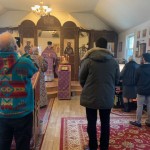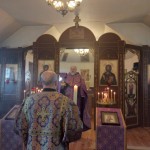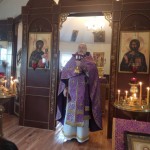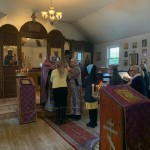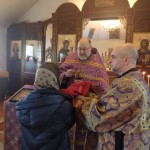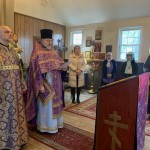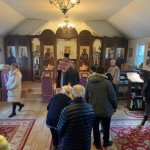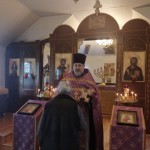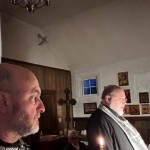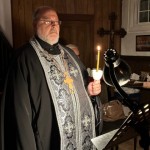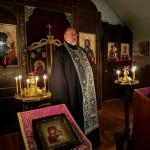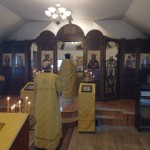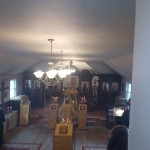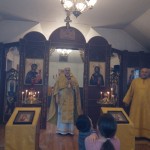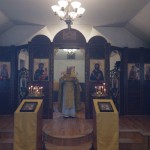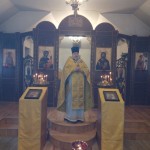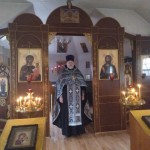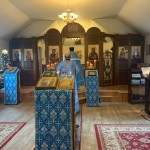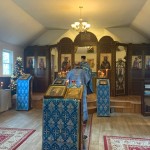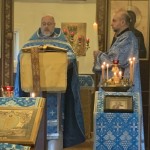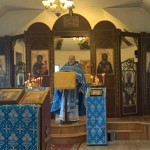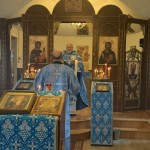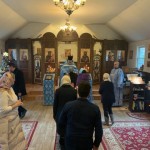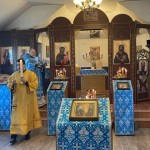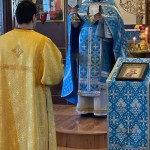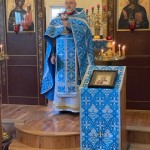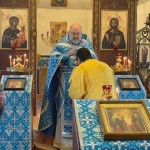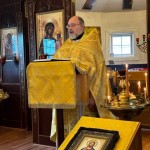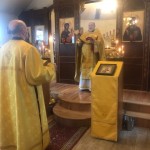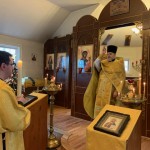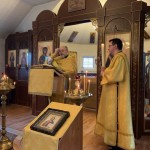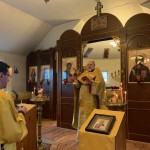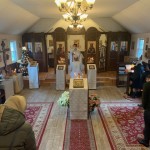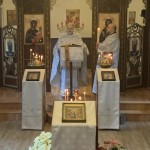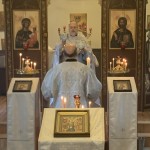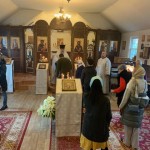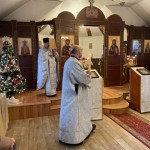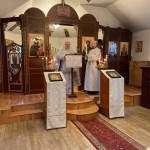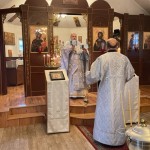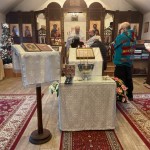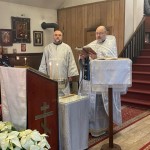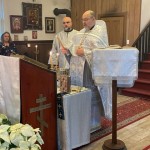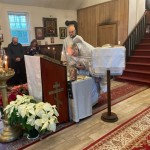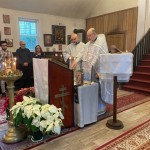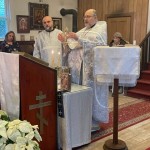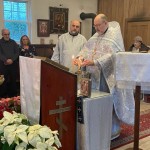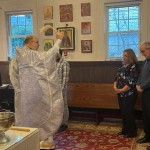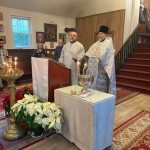On March 5, on the First Sunday of Lent, also known as celebration of the Triumph of the Orthodoxy, St. George parish had a nice liturgical service. Our Rector, Archpriest Igor Tarasov served the Liturgy of St. Basil the Great. After the Scripture readings he preached the following homily:
“Dear brothers and sisters in Christ! On the First Sunday of Lent we celebrate feast called Triumph of Orthodoxy. It is a commemoration of the victory of the Orthodox teaching regarding the holy images. Being Orthodox Christians and believing that God became Man, we venerate the holy icons, the images of Christ, of His Blessed Mother and of the Saints. There was a time when many Christians refused to honor those images, so it was a long struggle to reach that victory of the Orthodox faith. But that was only one page in the history of the Orthodox Church, one episode in the whole history of human salvation. Christian life requires to struggle and to get the victories all the time. Thus, let us today reflect on that”.
“History of mankind is full of different quests for victory and triumphs. A basic example is when people fight a war. Nowadays we are witnessing a terrible war in Ukraine. Regardless, whom do you support in that conflict, it is obvious that both sides are willing to win. But we, Christians, have to remember that the most important war in our life is our war against sin. And regardless, whom we consider our enemy in this life, our worst enemies are our sins, our passions and the devil. Sin is a cause of all wars people fight and of all conflicts they have. Therefore, our most important victory would be the victory over sin; and our most important and desirable triumph is our triumph over our passions. That would be our personal triumph of Orthodoxy”.
“Lent is a special time when we have a chance to fight our war against sin and passions. Such war should be fought all the time, but Lent gives us more opportunities to be be victorious. It can be compared to a special military training when the soldiers are focusing on their effectiveness, are actively preparing for the successful operations. During Lent we have special Church services, special prayers and Scripture readings. We have to abstain from certain food and limit our entertainment. All that helps us to fight our spiritual warfare. And Lent is leading us to the celebration of the greatest victory in the history of salvation – to the Resurrection of Christ, to Holy Pascha. Thus Lent can also be compared to a war, after which we anticipate a victory, a triumph of Orthodoxy – Holy Pascha”.
“Now, if we want to be victorious, we have to be good fighters in that war, to act like the heroes. Today’s Epistle lesson enumerates many heroic actions of the Old Testament Saints. First of all, we hear about Moses. Faith made him choose to renounce the riches and power and to become a leader of the Israelites. Adopted by the Pharaoh’s daughter, Moses had been brought up in great luxury of Egypt. He was a prince. But he had never forgotten his people. And the day came when he decided to join them. To do so, he left behind the riches and power, the royalty he might have had. So, St. Paul says that Moses considered “the reproach of Christ greater riches than the treasures of Egypt; for he looked to the reward” (Heb. 11, 26). In other words, Moses looked to the spiritual victory, to the triumph of true faith. And that was his greatest reward. Could we choose reproach of Christ over the riches and power? Unfortunately, sometimes we are not able even choose to pray, to attend the church over our earthly cares or simply over our laziness”.
“St. Paul also mentions other Old Testament heroes: Gideon, Barack, Samson, Jephthah, David, Samuel and other Prophets. He describes their endeavors (Heb. 11, 32-38). Can we imitate them, or we will prefer to go with the flow? Do we want to act or we want to cheat? Do we want to succeed or we want to slide? If we act, if we fight and want to succeed, we will become victorious. We will get our triumph in this Lent and in our life as well”.
“Today’s Gospel lesson describes the first encounter between certain Disciples of Christ with their Teacher and Lord, Jesus. It shows that they had a quest, a goal to find “Him of whom Moses in the law, and also the prophets, wrote” (Jn. 1, 45). They desired to find the Messiah. That was their spiritual goal. And we read in the Gospel that they succeeded. Meeting Jesus, they found Him. But to succeed, Nathaniel had to be “an Israelite indeed in whom no deceit” (Jn. 1, 47). The Apostles had to be spiritually and morally prepared, to be fit. Just as the soldiers have to be trained and prepared to fight the war to win. And that first encounter with Christ was not their final victory yet. It was a success but it was just the beginning of their long journey, of their ongoing warfare which finally led them to the victory, to salvation and to their triumph of faith. It was the start of their great life in Christ which led to the desired moment when they truly saw “heaven open, and the angels of God ascending and descending upon the Son of Man” (Jn. 1, 51)”.
“Dear brothers and sisters! Let us continue our started journey of Lent by spiritual endeavors which can make us victorious in our quest for salvation. We have passed the first week of Lent and some of us could get already involved into spiritual warfare against sin to get a triumph of Orthodoxy on Pascha. Those of you who did not – you still have the remaining six weeks of that blessed time. Again, let us remember that our main war is against sin, and our worst enemies are sins, passions and the devil who inspires them. Let us recall that our patron Saint, Holy Martyr George is called Victorious not because he was a warrior and defeated the human enemies on the battlefield. It is an error to think of him in that way. That error, unfortunately, is widespread. As every Christian Martyr, St. George became victorious because he defeated the sin and conquered the intrigues of the devil; because he preferred to die for Christ, he chose “the reproach of Christ greater riches” than the career of the Roman military officer. Thus, let us seek spiritual sense in our life and doing so, let us seek Christ. Then we will be successful in our spiritual warfare and will reach our own triumph of Orthodoxy – our salvation and Heavenly Kingdom!”
During the Litany of Fervent Supplication the Rector had a petition for the suffering country of Ukraine and its people. He also added a commemoration of the “suffering Ukrainian land” at the Great Entrance.
The choir prayerfully performed hymns of the Sunday of Orthodoxy during preparation for Holy Communion.
After the dismissal of the Liturgy the Rector performed prayer service of the Sunday of Orthodoxy solemnly declaring the Orthodox faith and proclaiming eternal memory to the champions of that faith and the Polychronion to the Church hierarchy and Orthodox Christians.
Following the service the Rector made some announcements and had a speech addressing some aspects of parish life. He pointed out that we need to be more zealous in our spiritual and liturgical life, to be attentive to the service schedule and to improve our pious behavior in the temple.

